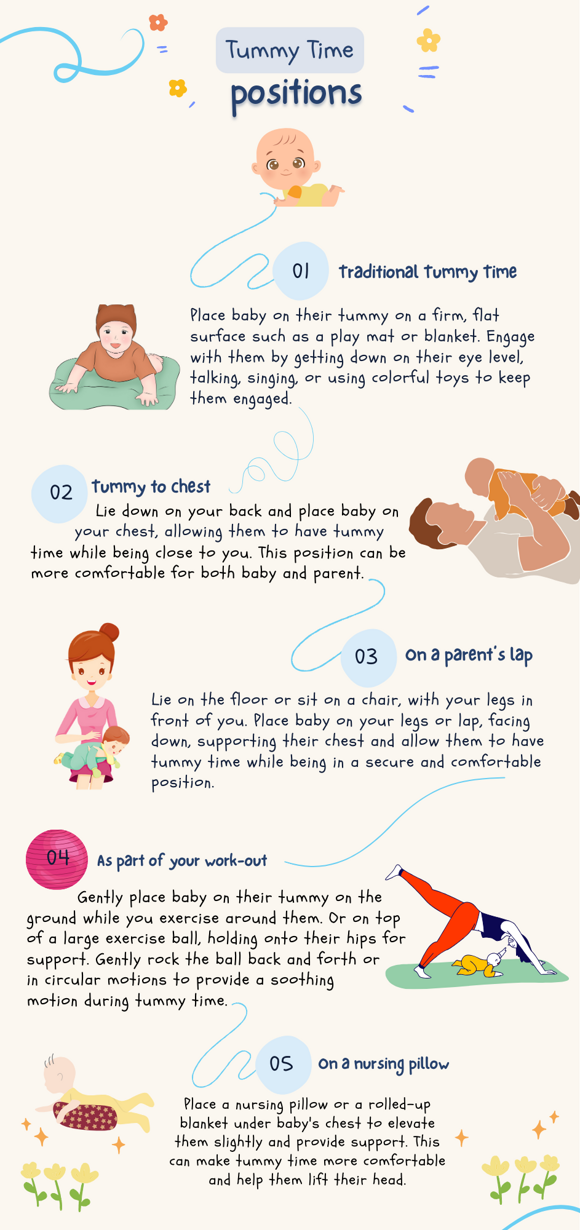
What is tummy time?
Tummy time is exactly as it sounds – allowing your baby to spend time on their tummy when they’re awake. It’s an important (and fun!) way to help your baby build strength in their upper body, including the muscles in their neck which builds head control.
Tummy time for infants can start soon after you bring your baby home from the hospital. At first, your newborn will struggle to lift their head even a tiny bit while on their stomach. Tummy time is hard, tiring work! A few minutes at a time, several times a day, is a great start. You can gradually increase the amount of time your baby spends on their tummy as long as they are happy and comfortable – and always be there to supervise.
Remember – never leave your baby alone when they are on their tummy.
When to start tummy time
Tummy time can start from the moment you bring your baby home from the hospital and is a great daytime activity. There are no strict rules as to when you should do it, just whenever your baby is happy to play along is fine. And if you find they’re getting a little fussy or aren’t enjoying it, there’s no need to force it.
How much tummy time is recommended per day?
In the very early days, your baby will most likely find this quite difficult and uncomfortable as they don’t have the strength yet. Regular daily episodes of tummy time for infants is designed to slowly build that strength that they’ll need to develop certain motor skills, like rolling and crawling when they’re a bit older.
- For newborns, starting with 1-2 minutes per day is all you need to aim for to begin with, and build this up to several times per day toward the 3-month mark.
- For 3-5 month olds, 10 – 15 minutes per day and build this up to 10-15 minutes several times a day toward the 6-month mark,
- For 6-12 month olds, tummy time can be at least 30 minutes over the course of the day. Be mindful that tummy time will be cut short very quickly as soon as your little one is crawling.
Remember all babies develop at different paces so remain patient, and small increases in time, or increases in the number of times they’re on their tummy over the day, will eventually get them to where they need to be… crawling, cruising and eventually walking, running and lots of play.
Is tummy time safe for newborns?
Yes, there are various safe tummy time positions for newborns. Supervision and safety during tummy time are crucial for your baby's well-being. Being present and attentive during tummy time allows you to:
- Ensure that your baby is in a safe environment, reducing the risk of accidents or suffocation.
- Monitor their positioning, ensuring their airway remains clear and they are comfortable.
- Respond promptly to any signs of distress or discomfort, providing reassurance and support.
- Remember to always place your baby on a firm surface, remove any potential hazards such as loose toys and blankets, and stay within arm's reach during tummy time to ensure a safe and enjoyable experience.
Spending time on their tummy is important while they are awake. However, you should always put them to sleep on their back. This position reduces the chances of Sudden Infant Death Syndrome (SIDS) and Sudden Unexpected Death in Infancy (SUDI). Seek guidance on safe sleeping strategies for your baby, and if in doubt always ask your healthcare professional.
Tummy time benefits for your baby
Tummy time aids both the physical and psychological development of your baby. Tummy time can be done in different environments and use different techniques to ensure it is as beneficial and as fun as possible for both bub and parent.
Physical tummy time benefits for a newborn
Here is a list of physical benefits of tummy time for a baby:
- Strengthening the neck and shoulder muscles.
- Developing and improving head control.
- Aiding in the prevention of flat spots on the back of the head (plagiocephaly) by providing an alternative position.
- Enhancing overall upper body strength.
- Promoting the development of motor skills, such as rolling, crawling, and eventually sitting up.
- Assisting in the development of core muscles.
- Supporting the development of gross motor skills necessary for later milestones like standing and walking.
Other developmental tummy time benefits for a newborn
- Stimulates the development of sensory skills, including vision, touch, balance, and spatial awareness.
- Encourages the development of hand-eye coordination as the baby reaches and explores their surroundings.
- Facilitates the natural progression towards independence through movement and exploration.
Remember, each baby develops at their own pace, so be patient and supportive during tummy time sessions. Always supervise your baby during tummy time and make sure they are on a safe and comfortable surface.
What happens if you don't do tummy time?
The benefits of tummy time include strengthening core muscle groups which allow your baby to eventually sit up, crawl, walk, run and play. If you don't do tummy time with your baby, it can potentially impact their growth and development in several ways including:
- Delayed motor skills;
- Weak neck and core muscles (your baby may experience delays in reaching key milestones such as rolling, crawling and sitting up);
- Flat head syndrome (without the opportunity to spend time on their tummy, babies may be at a higher risk of developing flat spots on the back of their heads, known as ‘plagiocephaly’);
- Sensory and visual development (without this stimulation of exploring the environment around them, their sensory and visual development may be impacted).
Positions for tummy time
Since tummy time is recommended to be a regular activity, it’s important to create some variety for your baby when deciding on positions for tummy time. Remember, always ensure that your baby is supervised when trying different tummy time positions and that they are on a safe and comfortable surface. Getting involved yourself can not only cover this requirement, but also increases your one-on-one bonding time… bonus! Gradually increase the duration of tummy time as your baby becomes more comfortable. If you have any concerns or questions about your baby’s progress, consult with your paediatrician or a healthcare professional for guidance.

Tummy time ideas for parents
Here are some creative tips and tummy time ideas to make tummy time enjoyable and effective for both you and your little one:
1. Choose your tummy time wisely
Your baby is more likely to enjoy tummy time when they are alert. After a nappy change or when your baby first wakes up from a nap are usually great times. If your little one is tired, hungry, or fussy, don’t pressure them to do tummy time. Let them have a nap, feed if hungry, or sing them a song while holding them, then try again later. Your baby may not enjoy tummy time to begin with and may only be able to tolerate a couple of minutes at a time. There may also be times which are not best such as tummy time after feeding. Build tummy time into your baby’s daily routine and keep at it!
2. Stay close and prepare for action
It may be hard to imagine with your tiny baby, but they will eventually learn to roll over, crawl, and sit up by themselves. Spending time on their tummy will help them gain strength to later roll over, crawl, and sit up. Just make sure you never leave your baby alone while they are on their tummy. Your baby’s mouth or nose could be covered accidentally, which may put them at risk of suffocating.
3. Reduce head pressure when choosing tummy time positions for newborns.
As well as building upper body strength, one of the key benefits of tummy time is protecting your baby’s head shape. Newborns sleep up to 14-17 hours every day, which means they spend a lot of time on their backs! Spending too long on their back can cause the back of your baby’s head to flatten. Spending longer periods of time each day on their tummy will help lessen the pressure on the back of your little one’s soft skull.
4. Find the positions for tummy time
When your baby is a newborn and has very little head control, they may need a little help to learn this skill. Place a rolled-up blanket or other support underneath their chest and armpits to give them a helping lift. Once your baby is older and stronger, and is more comfortable with tummy time, lay a blanket on the floor and place your baby on their stomach with their arms out in front of them. Alternatively, you could hold your baby on your chest as you recline on a couch or pillows for some great bonding and tummy time in one!
5. Tummy time after a feed
It’s generally best to wait at least 30 minutes after a feeding before engaging in tummy time. This helps prevent discomfort or spitting up during the activity. However, if your baby seems fussy or restless, you can try tummy time before a feed. Just remember to always keep an eye on your little one and adjust the timing based on their needs.
Frequently asked questions about tummy time
How do you do tummy time?
To do tummy time, place your baby on their tummy on a firm surface, such as a play mat or blanket. Start with very short sessions of only 1-2 minutes, gradually increasing the time as your baby grows stronger. Tummy time ideas can be as simple as getting down to their eye level and engaging with them by using toys or colourful objects to keep them interested. You can also try different positions like tummy-to-chest or tummy time on a nursing pillow. Remember to always supervise your baby during tummy time and make it a fun and enjoyable experience for both of you.
How much tummy time per day?
Tummy time benefits can be achieved by starting with very short sessions of only 1-2 minutes a day when your baby first comes home from hospital. Then gradually increase the number of times they do tummy time over a day, followed by gradually increasing the duration to 10-15 minutes per session. You can keep increasing this until they’re comfortably achieving at least 30 minutes over the course of a day, every day.
Does tummy time help with gas?
There may be several reasons why a baby is experiencing gas. This is quite a common symptom of infancy, as a baby’s gastrointestinal tract is still maturing. Tummy time itself may not directly alleviate gas in babies, however the gentle pressure on the abdomen during tummy time, and the movement and stretching involved in tummy time may help stimulate bowel movements and encourage movement of trapped gas. If you have concerns about your baby's gas or digestive issues, consult with your paediatrician for personalised advice.
Does lying on chest count as tummy time?
Yes, lying your baby on their chest, or yours for that matter, is a great tummy time position for newborns. Incorporating this tummy time activity into your baby’s daily routine will help support their physical and cognitive development. Be mindful of the timing of tummy time, ensuring your baby is awake, alert and comfortable. Avoid tummy time directly after feeding.
How to do tummy time with a newborn?
Introducing tummy time to your newborn is a wonderful bonding experience. Choose a safe, flat surface and place your baby on their tummy for short sessions of 1 to 2 minutes and build this duration up as they grow stronger. Tummy time positions for newborns shouldn’t be too complex, engage them with toys or your face to encourage head lifting. Always supervise and gradually increase the duration as they grow stronger, ensuring it remains a positive experience.
Why is tummy time important?
Tummy time helps strengthen the neck, shoulders, arms, and back muscles, which are essential for milestones such as rolling over, sitting up, and crawling. Additionally, tummy time promotes sensory development, allowing your baby to explore their surroundings and improve hand-eye coordination. Most importantly, it helps prevent flat spots on the back of the head, which can occur when babies spend too much time lying on their backs.
How much tummy time for newborn?
For newborns, tummy time can start as early as the first few days after birth. Initially, aim for about 2 to 3 sessions of tummy time each day, lasting 1 to 2 minutes each time. As your baby grows and becomes more accustomed to this position, you can gradually increase the duration. Always supervise your baby during tummy time and ensure they are on a safe, flat surface.
How much tummy time at 3 – 4 months?
At three months, your little one should be enjoying tummy time for about 20 to 30 minutes each day, spread out over several sessions. This can be done in short bursts of 3 to 5 minutes at a time, gradually increasing the duration as your baby becomes more comfortable and stronger. Remember, every baby is unique, so it’s important to follow your child’s cues and adjust the tummy time accordingly.
Sources:
- Raising Children website. Accessed at Tummy time for babies: in pictures | Raising Children Network
- Pregnancy, Birth and Baby website. Accessed at Tummy time | Pregnancy Birth and Baby



